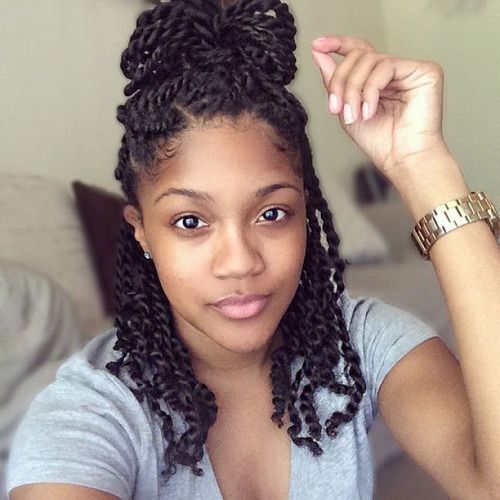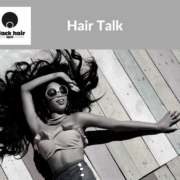What are Hair Twists?

Photo source: https://hairstylecamp.com/havana-twist-hairstyles/
Black hair has gone through many cultural shifts and evolutions over the years but it continues to be a symbol of our identity and a response to the culture around us. In the 80’s and 90’s a rising cultural awareness of black power and beauty spurred the need for diversity in hair styles in the black community. Black women began embracing textured styles such as braids, twists and locs; borrowing from the cultural freedom of the 60’s to create styles that showcased black hair in unique ways. Twists became increasingly popular in the 90’s and 2000’s and have recently made a come back with even more options available with crochet styling methods.
Hair Twists: Simple Yet Beautiful
Twists are created by a process of wrapping two strands of hair around each other until hair resembles a rope (hence the term ‘rope twists’.) The nature of black hair and the ability for kinky strands to wrap themselves around each other, prevents the twist from unravelling when done properly. Extensions with a coarse texture can be used to install twists if you have silky or chemically processed hair. In many cases, single twists are more versatile than single braids because they are easier to manipulate into various styles.The thickness, texture and style of your twist can also vary depending on the type of hair you use to install them.
Taking Care of Twists
This hairstyle is also great because it’s easy to maintain and can last up to 6 weeks or more. But beware of the tendency to completely ignore your hair just because it’s in a protective hair style. To ensure your hair is healthy and strong after removing your twists follow these maintenance tips:
Washing Twists
Don’t be afraid to get in there and wash your twists if you feel that there is a buildup of product and dirt. To avoid your hair getting frizzy part your hair into sections and let warm water run through it. When shampooing run hands down your twists gently letting the water do most of the work. Afterwards wrap your hair with a warm towel to seal hair strands and prevent any additional fraying caused by excessive rubbing. You can also take the dry-shampoo route to be on the safe side.
Different twists may require a slightly different maintenance routine. For example, wearing twists in your natural hair may make it easier for you to wash and moisturize. If you have extensions or crochet twists you may need to use dry-shampoo or spray moisturizers to maintain hair.
Moisturizing Twists
Find a great penetrating oil to moisturize your hair while it’s in twists. This will ensure that moisture is retained in your hair shaft which will make your hair soft and easier to manage when you take out the twists. It will also help with hair growth and reducing breakage. The ultimate goal of any protective style is not just to look cute, but to make hair stronger and healthier. You can also use leave-in conditioner on your twists by coating strands beginning at the roots.
Sleep with a Satin/Silk Scarf
If you want your twists to stay neat you’ll need to tie your hair down with a silk-scarf or bonnet each night before going to sleep. This protects your hair from fraying when rubbed against your pillow and sheets.
Wearing Twists – Different Hairstyles
There are many different ways to install and style twists, making them as diverse and resilient as black hair itself. Twists can also be styled in virtually every way you wear your own hair; you can wear them as a mohawk, up-do or ponytail – the options are limitless. There is so much to this simple hair style it’s no wonder it’s a favourite of women of all hair types.
Here are some examples of the different ways you can rock your twists:
Senegalese/Rope Twists

Photo source: https://hairmotive.com/senegalese-twist/
Senegalese twists or ‘rope twists,’ are named after the West African country of Senegal where they originated. This style is typically achieved using Kanekalon (synthetic) braiding hair which gives it a smooth, silky look. The downside to this however is that the hair is easier to unravel if not done correctly.
Marley Twists
Marley twists are coarser than Senegalese twists, resembling the dreadlocked hair style of Mr. Bob Marley himself. Because of its coarse texture, Marley twists are a lot easier to install on your own. A simple two strand method is all you need to create this look.
Havana Twists

Photo source: https://hairstylecamp.com/havana-twist-hairstyles/
Havana twists are often confused with Marley twists because both looks are created with the Marley braiding hair. The difference is in the thickness, with Havana twist being almost twice the size of Marley twists.








Leave a Reply
Want to join the discussion?Feel free to contribute!